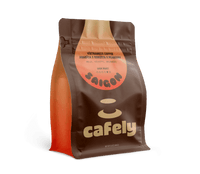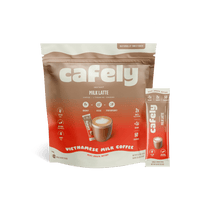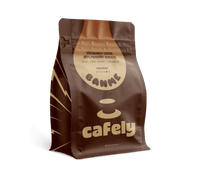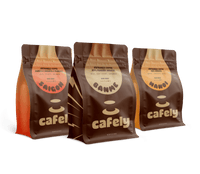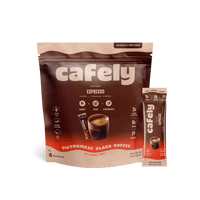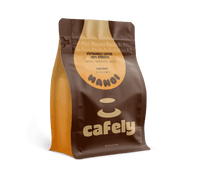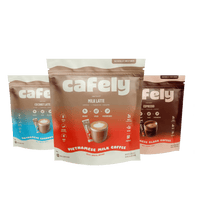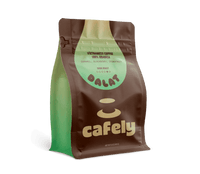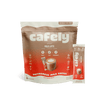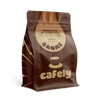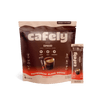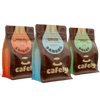Coffee is more than a morning fix — it may be linked to better liver health. Research shows it may reduce fat buildup, lower inflammation, and support detoxing [1].
However, not all coffee has the same effect.
Roast level, bean quality, and brewing style all influence how your body responds.
In this article, we’ll break down the best types of coffee for liver support, why they work, and how to brew your cup for maximum impact.
Simple swaps, smarter sips — and a healthier liver with every mug.
Best Types of Coffee for Liver Health
Not every cup of coffee offers the same benefits. Some roasts contain more helpful compounds, while others may be gentler on your system.
Here are the types of coffee worth considering if liver health is your goal.
1. Dark Roast Coffee
Dark roast coffee isn’t just bold — it’s actually better for your liver.
Here’s why:
- It has less cafestol, a compound known to raise cholesterol levels (which can strain your liver).
- It’s higher in certain antioxidants that protect liver cells from damage.
Dark roast coffee tends to be smoother, too, which makes it easier on your stomach and liver [2].
Try dark roast coffee if you’re looking for flavor-packed options that don’t burden your system. Each blend is carefully roasted to bring out deep, smoky notes without harsh acidity. The best dark roast selections are available in either arabica, robusta, or blends of both beans.
2. Organic Coffee Options
Your liver helps filter out toxins, including pesticides, so it’s smart to choose organic coffee whenever possible.
Organic beans are grown without synthetic chemicals, which reduces your exposure to potential liver irritants [3].
This is especially helpful if you’re dealing with fatty liver or detox challenges.
Want an easy option? Cafely’s Organic Instant Coffee offers clean, pesticide-free blends that are quick to make but kind to your liver. If you love a richer, bolder brew, DaNang Coffee is a great choice.
This medium-dark blend combines arabica and robusta beans for a perfect balance of flavor and strength. Robusta beans tend to contain more antioxidants, while arabica is smoother and easier to digest [4].
It’s also low in sugar and contains no artificial ingredients — ideal for people trying to manage fatty liver and blood sugar levels.
Think of it as your daily go-to — bold enough to satisfy, clean enough to support your health goals.
How Coffee Supports Liver Health

It comes down to the unique compounds found in each cup — and how they work with your body.
1. Rich in Antioxidants
Coffee is one of the top sources of antioxidants in most people’s diets [5].
One of the key compounds, chlorogenic acid, helps prevent fat buildup in the liver by improving how your body handles glucose. It also fights inflammation and oxidative stress — two big players in liver damage.
If you're looking for a solid antioxidant boost, the DaLat Coffee is made from 100% arabica beans grown at high altitudes in Vietnam. This slow-growing method produces beans rich in beneficial compounds that protect liver cells over time.
2. Helps Prevent Fatty Liver Disease
Fatty liver disease — now known as MASLD (metabolic dysfunction-associated steatotic liver disease) — affects nearly 1 in 4 adults [6].
Left untreated, it can lead to liver scarring or even cancer. However, studies show that people who drink 3 to 4 cups of coffee a day are less likely to develop this condition [7]. The reason? Coffee helps improve insulin sensitivity, reduce liver fat, and lower inflammation.
Even people who already have MASLD can benefit. Regular coffee drinkers are less likely to progress to cirrhosis or liver failure, and they tend to live longer with the disease.
3. Promotes Natural Detox
Your liver is your body’s detox hero, and coffee gives it a boost. How? [8]
- It helps activate autophagy, the process that removes damaged liver cells.
- It reduces scarring by lowering activity in adenosine receptors, which are linked to liver injury.
These small effects add up over time — think of coffee as a daily support tool, not a cure.
Brewing Coffee for Maximum Liver Benefits
How you brew your coffee matters just as much as what kind you choose. Certain methods can boost coffee’s benefits, while others may introduce compounds that put extra pressure on your liver.
If you want to protect your liver and still enjoy your daily cup, a few brewing tweaks can go a long way.
1. Use Filtered Coffee Over Boiled Coffee
One of the biggest shifts you can make? Use a filter.
Boiled or unfiltered coffee — like French press or Turkish coffee — may taste rich, but it also contains more cafestol, a compound that can raise cholesterol and potentially burden the liver over time.
Filtered methods, such as drip coffee, remove much of this compound without sacrificing the benefits of antioxidants.
That’s why drip brewing is a great choice for liver-conscious drinkers.
2. Cold Brew Benefits
If you struggle with acid reflux or liver sensitivity, cold brew might be your solution.
Cold brewing lowers the acidity of your coffee, making it gentler on the stomach and liver. Since it steeps slowly in cold water, it still retains powerful antioxidants, just without the harsh, bitter, acidic edge that hot brewing can bring.
Cold brew also pairs beautifully with stronger beans, like robusta, to create smooth, mellow drinks with bold flavor.
Looking for a bean that holds up to these brewing methods? BanMe Coffee, made from 100% Peaberry robusta, is a perfect pick.
Peaberries are rare — they grow as a single seed rather than the usual pair, concentrating the flavor and strength.
With notes of dark chocolate and black cherry, BanMe works beautifully in a coffeemaker or a slow pour-over.
Just remember to pair it with a paper filter if you want the liver benefits of reduced cafestol.
Coffee Consumption: How Much Is Too Much?
More isn’t always better — even with something as antioxidant-rich as coffee.
As we mentioned above, some studies show drinking three to four cups a day is the sweet spot for liver health. At this range, you get the protective effects without pushing your system too hard [6].
Go beyond that, and you may start to feel the downsides of caffeine overload — think jitters, dehydration, or even triggering liver enzymes that do more harm than good [9].
One way to keep things in check? Try a lighter blend that’s easy to portion.
Cafely’s Vietnamese Instant Coconut Latte is a smart alternative. It’s a no-sugar, naturally sweetened blend with coconut cream and monk fruit, designed to satisfy without the crash.
Each packet is double-shot strong, so you get flavor and focus — without having to brew cup after cup.
Liver Health & Lifestyle: Pairing Coffee with Good Habits

Coffee can absolutely support your liver, but it’s not a cure-all. The real magic happens when it’s part of a bigger, healthier routine.
Here’s how to pair your brew with liver-smart habits:
Balanced Diet — Stronger Liver
What you eat has a direct effect on your liver’s ability to detox, repair, and regenerate [10].
Try adding more of these foods to your diet:
- Leafy greens (spinach, kale)
- Berries (blueberries, raspberries)
- Almonds and walnuts
- Fatty fish like salmon or sardines
These foods provide essential nutrients like omega-3s, vitamin E, and polyphenols — all of which help reduce inflammation and support healthy liver enzymes.
Hydration — Coffee Can’t Do It Alone
Drinking coffee is not bad — but don’t forget your water.
Caffeine is a mild diuretic, which means it can dehydrate you if you’re not careful. And your liver depends on hydration to flush toxins and keep bile flowing properly.
Try this rule: for every cup of coffee, drink one glass of water. This keeps your liver happy and your energy levels balanced.
Coffee + Healthy Snacks
Coffee doesn’t have to be heavy or sugar-loaded.
HaNoi Coffee is made from 100% robusta beans and delivers a bold, earthy flavor with notes of roasted walnut and dried date — no need to sweeten.
It’s a strong brew, perfect for pairing with liver-friendly snacks like almonds, whole-grain toast, or fresh fruit.
The dark roast makes it satisfying, while its rich profile means you can skip the creamer and keep it clean.
FAQs: Coffee & Liver Health
Let’s address some common questions to see what kind of coffee is good for the liver:
1. Is Dark Coffee Good for the Liver?
Yes. Dark roasts are lower in cafestol and higher in antioxidants, which protect liver cells.
2. What Is the Fastest Way to Cleanse Your Liver?
Eat more whole foods, avoid alcohol, and drink plenty of water to support natural detox.
3. What Kind of Coffee Can I Drink With Fatty Liver?
Black, organic coffee made with a paper filter is the best choice for liver support.
4. Is Milk Good for the Liver?
Yes, in small amounts. Choose low-fat or plant-based milk if you’re watching fat intake.
5. What Color Is Your Urine When Your Liver Detoxifies?
Pale yellow is normal. Very dark or brownish urine may signal liver stress and should be checked.
6. What Are the Three Worst Things for Your Liver?
Alcohol, added sugar, and processed food all put extra strain on your liver.
7. Is Black Coffee Good for the Liver?
Absolutely. It’s one of the simplest and most effective options for supporting liver health.
8. Is Nescafe Coffee Good for the Liver?
It’s fine in moderation, but look for organic or filtered brews for more liver-friendly benefits.
9. How to Make Coffee for Fatty Liver?
Use a paper filter, avoid sugar and cream, and drink it black to maximize antioxidant intake.
10. How Do I Know if My Liver Is Healing?
You might notice better digestion, more energy, and improved lab results from your doctor.
References
- Rasheed, N., & Rasheed, Z. (2025). Coffee and liver health: Exploring the protective benefits and mechanisms of coffee and its bioactive compounds in liver disorders. International Journal of Health Sciences, 19(1), 1.
- Rubach, M., Lang, R., Bytof, G., Stiebitz, H., Lantz, I., Hofmann, T., & Somoza, V. (2014). A dark brown roast coffee blend is less effective at stimulating gastric acid secretion in healthy volunteers compared to a medium roast market blend. Molecular Nutrition & Food Research, 58(6), 1370–1373.
- Silva, D., Albuquerque, T. G., Costa, H. S., & Pavesi, A. (2023). Thermal Contaminants in Coffee Induced by Roasting: A Review. International Journal of Environmental Research and Public Health, 20(8), 5586–5586.
- Freitas, V. V., Rodrigues Borges, L. L., Dias Castro, G. A., Henrique dos Santos, M., Teixeira Ribeiro Vidigal, M. C., Fernandes, S. A., & Stringheta, P. C. (2023). Impact of different roasting conditions on the chemical composition, antioxidant activities, and color of Coffea canephora and Coffea arabica L. samples. Heliyon, 9(9), e19580.
- Bae, J.-H., Park, J.-H., Im, S.-S., & Song, D.-K. (2014). Coffee and health. Integrative Medicine Research, 3(4), 189–191.
- Chan, W., Kee Huat Chuah, Rajaram, R., Lim, L.-L., Jeyakantha Ratnasingam, & Shireene Ratna Vethakkan. (2023). Metabolic Dysfunction-Associated Steatotic Liver Disease: A State-of-the-Art Review. Journal of Obesity & Metabolic Syndrome, 32(3), 197–213.
- Lee, J.-H., Park, J., & Sang Bong Ahn. (2023). Different Associations of Coffee Consumption with the Risk of Incident Metabolic Dysfunction-Associated Steatotic Liver Disease and Advanced Liver Fibrosis. Nutrients, 16(1), 140–140.
- Morisco, F., Lembo, V., Mazzone, G., Camera, S., & Caporaso, N. (2014). Coffee and Liver Health. Journal of Clinical Gastroenterology, 48, S87.
- Evans, J., Battisti, A. S., & Richards, J. R. (2024, May 29). Caffeine. National Library of Medicine; StatPearls Publishing.
- Mega, A., Marzi, L., Kob, M., Piccin, A., & Floreani, A. (2021). Food and Nutrition in the Pathogenesis of Liver Damage. Nutrients, 13(4), 1326.
